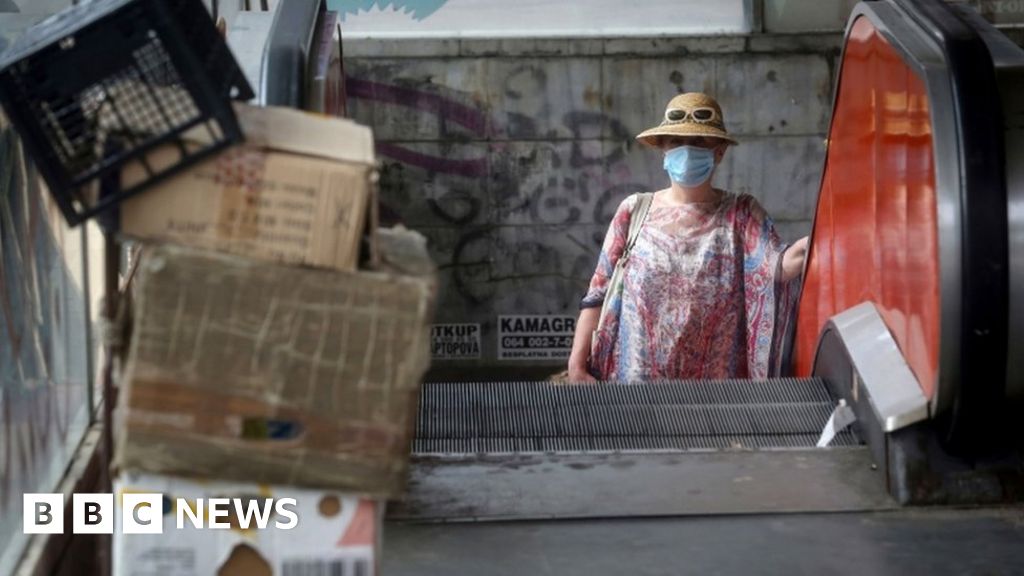Coronavirus: Greece bars Serbian visitors as Balkans cases rise - 4 minutes read
 Image copyright Getty Images Image caption Serbian authorities have brought back restrictions in a number of cities, including Belgrade
Image copyright Getty Images Image caption Serbian authorities have brought back restrictions in a number of cities, including BelgradeGreece has banned all but essential travel from Serbia as infection numbers steadily rise in the Balkan country.
For a week from Monday morning, all entry points are closed to Serbian travellers, Greek officials said.
It comes days after Serbian authorities re-imposed lockdown restrictions in the capital Belgrade.
In the last 24 hours there have been another 302 infections reported in Serbia, with more than 16,000 total cases and a death toll of 311.
In May, there were about 50 new cases reported daily.
Currently, Serbia is on a list of 15 countries whose citizens are allowed to enter the EU, after the bloc partially reopened its external borders on 1 July. Individual member states are not, however, bound by the list and make their own decisions on border controls.
Serbia is also on a list of countries whose citizens do not need to quarantine on arriving in England.
But there has been a significant rise in cases throughout the Balkans recently.
Montenegro recorded a record daily rise in infections on Sunday, while Kosovo has brought back a nightly curfew in the capital Pristina as cases rise.
Austria issued a travel warning for six Balkan nations on Tuesday, including Serbia and Montenegro. And Croatia has reinstated 14-day quarantines for travellers from Bosnia, Kosovo, North Macedonia and Serbia after it saw a spike in infections late in June.
Belgium meanwhile has not opened its borders to any of the 15 nations on the EU list.
What's happening in Serbia?
Authorities have declared a state of emergency in several major cities and towns in Serbia, including Belgrade, Kragujevac and Novi Pazar.
Gatherings are restricted, opening hours for cafes and restaurants have been shortened, sporting events are banned and masks are compulsory on public transport and in indoor public spaces.
Image copyright Getty Images Image caption Soldiers have set up field hospitals across Serbia, including in Novi Pazar
Novi Pazar is particularly badly affected, with local media reporting a lack of medical equipment there - allegations which the authorities have denied. Prime Minister Ana Brnabic was booed on a visit to the city last week.
After imposing one of Europe's strictest lockdowns in March, Serbia lifted its nationwide restrictions in May. Since then the country has held football matches with spectators, religious festivals and even parliamentary elections in June.
But cases have risen substantially since then. Last week a number of high-ranking officials in the ruling coalition tested positive for Covid-19 after attending an election victory party.
In June, the Balkans Investigative Reporting Network (BIRN) issued a report alleging that Serbia had underreported cases and deaths during the outbreak.
President Aleksandar Vucic criticised that article on Thursday, alleging their data was "not authentic".
People from countries in the Western Balkans have been counting on open borders, after long weeks enduring some of Europe's strictest lockdown measures. Instead they are finding themselves on the receiving end of EU countries' discretionary frontier policies.
Serbia and Montenegro were both included on the EU's list of 15 "safe" countries. But the majority of the bloc's 27 member states have decided to bar entry - or allow it only with restrictions.
This morning, Greece became the latest country to show Serbians the red light. That's a particularly bitter blow for the people of a landlocked country who decamp in vast numbers to Greek beaches every summer.
Slovenia has even tightened restrictions on arrivals from neighbouring Croatia. It says part of the reason is to prevent entry to people coming from countries further south on the Balkan peninsula.
Most countries in the region have reported a rising number of Covid-19 cases in recent weeks - and several have broken their previous records for the daily number of new cases.
But for the moment, numbers are nowhere near the peak levels seen in countries such as the UK, the US and Sweden. So when Serbians see pictures of British tourists sunning themselves on Adriatic beaches, it would be understandable if they nursed a sense of injustice.
Source: BBC News
Powered by NewsAPI.org